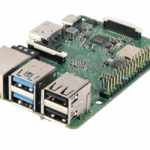Supply chain and logistics management are typically an underrated yet important features of a successful company — and one where technology and digitalization are making a big difference. Inadequate communication, tracking, and traceability of products could lead to wasted time, unnecessary billable hours, and lost revenue. However, technology can provide better transparency and accountability.
 GoBOLT, a Gurugram-based tech startup, was established in late 2015, to address major inefficiencies in large logistics providers in India. The company’s three founders — Sumit Sharma, Naitik Baghlaall, Parag Aggarwal — come from corporate backgrounds, having worked in organizations such as Ernst & Young, GSK, J M Financial, and Tata Motors.
GoBOLT, a Gurugram-based tech startup, was established in late 2015, to address major inefficiencies in large logistics providers in India. The company’s three founders — Sumit Sharma, Naitik Baghlaall, Parag Aggarwal — come from corporate backgrounds, having worked in organizations such as Ernst & Young, GSK, J M Financial, and Tata Motors.
The idea for GoBOLT arose when Sharma visited North America and, during his travels, happened to noticed the high rate of transportation and trucking on U.S. and Canadian highways. He began to research the transportation industry in India.
“The Indian logistics industry is worth $200 billion,” he shared. It’s a big sector with tremendous potential and opportunities. What’s more: “Nearly 70 percent of the market is fragmented, including small freight operators who own [only] one to five trucks. They are dependent upon local agents for getting freight daily.”
Sharma also learned that a dependence on brokers in the industry often led to problems for the small freight operators, adding to costs and providing few benefits in return. Part of the reason for this was a lack of digital records or use of technology to ensure clear, traceable communication, and transactions. There was also a lack of market visibility, generally leading to lower than expected asset use and poor revenues.
In addition, the logistics industry seemed plagued by unprofessionalism, which was evidenced by complaints of poor customer service.
All these factors rendered India’s logistics use at 13 percent of GDP, which may sound reasonable. However, most efficient economies spend only about six to eight percent of their GDP on logistics with better returns on such investments.
Sharma and his team at GoBOLT believed such inefficiencies were simple enough to fix in the logistics industry, given access to the right technology. For GoBOLT this meant incorporating artificial intelligence and machine learning-based technologies to better maintain and track the supply chain at a company.
“So, we offer technology and logistics solutions in supply chain administration, from ‘design to deliver,’ including transportation, warehousing, and supply chain planning,” explained Sharma. A BTech grad from Delhi College of Engineering, with an MBA from SP Jain, Mumbai, Sharma began his career with Ernst & Young and then moved to JM Financial. He is now responsible for the investment, business development, and marketing at GoBOLT.
Sharma’s also a member of FICCI’s core group for the advancement of a ‘Roadmap for Decarburization of the Transport Sector in India by 2050.’ FICCI provides a voice for India’s business and industry that supports positive policy changes.
GoBOLT’s aim is to provide transportation, warehousing, and supply chain technology solutions to businesses across industry types. They work pan India, with a focus on the north, south, and west passageways of India. Their industry type exposure varies from FMCG, eCommerce, liquor, tire manufacturing, movables, and waste management firms.
The Launchpad advantage
At the center of the services offered by GoBOLT is a SaaS-based logistics management method, called Launchpad. The product is a logistics platform designed to obtain high asset use, efficiency, and scale without unnecessary costs.
Their first customer was one of the biggest footwear, clothing, and accessories manufacturers, which was searching for a dispatcher for its facility in Uttarakhand.
“We grabbed that opportunity, and after a month of research at the factory and transportation business [devised] an effective solution, which decreased their logistics cost by 10 percent,” said Sharma. “We landed the first contract, the original truck on GoBOLT’s platform was transferred from Dehradun to Delhi NCR.”
GoBOLT routinely competes with the likes of Lobb and FreightBro.
“We’re heavily distinguished from our competitors by the use of technology and a disruptive business model,” he shared. “We have created a cloud-based solution with a modular framework — where various modules manage various entities and operations in the system such as customer administration, marketplace [brokers, market vehicles, drivers, etc.] department, our fleet, and driver management, trip management, hub management, finance management, etc.”
The founders first bootstrapped the business with smaller than Rs 50 lakh. GoBOLT then raised Rs 40 crore from Aavishkaar-Intellecap Group’s Aavishkaar Bharat Fund in September 2018.
Today, GoBOLT has more than 40 customers with an annualized run rate of Rs 250 crore. Its business model is to work on a per-load basis with customers whenever the company’s latest tech service is used: the new Launchpad app.
However, getting customers to use the app proved more challenging than GoBOLT first anticipated.
“We had rolled out the mobile customer application as well as transporter/vendor mobile application. Getting the transporters and drivers to begin using technology was a difficult task,” admitted Sharma. “Still, slowly and steadily, we have gained deep technology penetration in the industry and harvested the benefit of data flow.”
As far as direct plans go, the startup wants to increase its footprint in India. It also has big plans to triple its revenue in the next 18 months.
You may also like:
Filed Under: Blog entry, Tech Articles








Questions related to this article?
👉Ask and discuss on Electro-Tech-Online.com and EDAboard.com forums.
Tell Us What You Think!!
You must be logged in to post a comment.